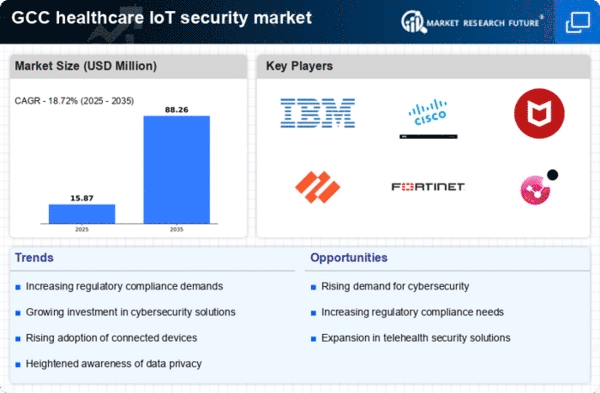Regulatory Compliance and Standards
Regulatory compliance is a critical driver influencing the healthcare iot-security market. Governments in the GCC are implementing stringent regulations to ensure the protection of patient data and the integrity of healthcare systems. Compliance with these regulations often necessitates the adoption of advanced security measures, which in turn fuels market growth. For instance, the introduction of data protection laws mandates healthcare organizations to implement robust security protocols for their IoT devices. This regulatory landscape compels stakeholders to invest in security solutions that not only meet compliance requirements but also enhance overall operational resilience. As a result, the healthcare iot-security market is likely to expand as organizations strive to align with evolving regulatory standards.
Advancements in Security Technologies
Technological advancements in security solutions are driving the healthcare iot-security market forward. Innovations such as blockchain, machine learning, and advanced encryption techniques are being integrated into security frameworks to enhance the protection of IoT devices. In the GCC, the adoption of these technologies is expected to increase by 25% over the next few years, as healthcare organizations seek to bolster their defenses against cyber threats. These advancements not only improve the efficacy of security measures but also provide healthcare providers with the tools necessary to respond to incidents swiftly. Consequently, the healthcare iot-security market is poised for growth as organizations leverage cutting-edge technologies to secure their IoT ecosystems.
Increasing Incidence of Cyber Threats
The rising incidence of cyber threats targeting healthcare organizations is a significant driver for the healthcare iot-security market. Cyberattacks, including ransomware and data breaches, have become more sophisticated, posing severe risks to patient safety and data integrity. In the GCC, healthcare institutions have reported a 30% increase in cyber incidents over the past year, underscoring the urgent need for enhanced security measures. As a result, healthcare providers are compelled to adopt comprehensive security frameworks to protect their IoT infrastructure. This trend is likely to propel the healthcare iot-security market as organizations seek to mitigate risks and safeguard their operations against evolving cyber threats.
Rising Patient Awareness and Expectations
The rising awareness among patients regarding data privacy and security is influencing the healthcare iot-security market. Patients are increasingly concerned about how their health information is managed and protected, leading to heightened expectations for security measures in healthcare settings. In the GCC, surveys indicate that over 70% of patients prioritize data security when choosing healthcare providers. This shift in patient expectations compels healthcare organizations to adopt robust security protocols to maintain trust and ensure patient satisfaction. As a result, The healthcare IoT security market is likely to grow as organizations implement comprehensive security strategies that address patient concerns..
Growing Demand for Connected Medical Devices
The proliferation of connected medical devices in healthcare settings is a primary driver for the healthcare iot-security market. As hospitals and clinics increasingly adopt IoT-enabled devices for patient monitoring and data collection, the need for robust security measures becomes paramount. In the GCC region, the number of connected medical devices is projected to reach 1.5 million by 2026, highlighting the urgency for effective security solutions. This surge in device connectivity raises concerns about data breaches and unauthorized access, prompting healthcare organizations to invest in advanced security protocols. Consequently, the healthcare iot-security market is expected to witness substantial growth as stakeholders prioritize safeguarding sensitive patient information and ensuring compliance with regulatory standards.
















